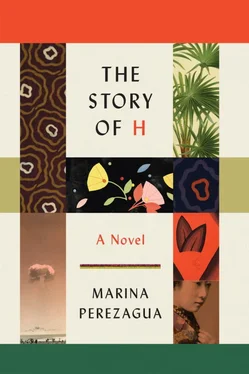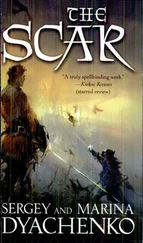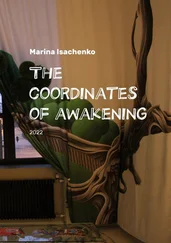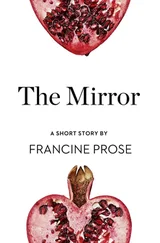When the people next to the barbed wire left, I saw that Yoro’s head was resting sideways on the ground. I didn’t want to wait any longer, but she grabbed me by the arm and held me there in the hole. She said the spiders made music when they wove their webs, that the larvae made a sort of purring sound when they grow, like lounging cats. She assured me that these tiny sounds are beautiful and that she had learned how to discern them in the mines. She appreciated these souls that for years were her only company, lives that nobody paid attention to, which were squashed under a foot or simply ignored. Then she told me she was afraid. And something happened then, sir, which I will never be able to forget. Yoro stretched out a hand and I saw what she wanted to show me by the light of my tiny lantern. A flying ant had opened its wings in the palm of her hand, in the form of a cross, and it’s not that I’m Christian or believe in many things, but I had to think it was nature’s way of sharing our circumstances. A snail left its shell, and after leaving a slippery trail, like a long, continuous kiss, it returned to its shell with its antennas down. A lizard egg cracked so that Yoro could see—and it seemed such an obvious, generous gesture—the spectacle of the creature’s premature birth. All these minimal lives were with Yoro. Not a single one of these creatures was on my skin. They were all on Yoro, caressing her in their own way. I think that if Yoro had been able to walk she would have gotten up; thousands of tiny backs would have held her and carried her faceup, looking at the starry sky. But I was there to move her, and after delicately brushing off all that life that had settled on her skin, I finally helped her up, and we moved to the other side of the fence.
It was the dead of night, and the area had become a boggy pit from all the rain. We had to walk with special care so our footfalls didn’t make noise splashing in the water. Luckily, the tent we were looking for wasn’t too far away from the hole we’d entered and, anyway, in the worst-case scenario, it wasn’t likely that anyone not in uniform would be bothered by our presence. Flies don’t generally bother other flies—they prefer to bother people, and there weren’t any people there because anyone who entered that place was transformed into a black insect that fought over the world’s garbage with other black insects. You might think that in the case of a refugee camp, the fence is there to protect those inside from what is on the outside. But that wasn’t the case. As I have already explained, many of the refugees were faced there with a war inside of a war, where humanitarian aid was sold at a premium, much higher than on the outside.
Once I spied the pavilion and before Yoro said anything, I knew it was the one we were looking for. It wasn’t hard to figure out. It was all lit up, and from outside we heard the sounds of laughter and jolly music I could identify only once we were a little closer. Good old rock ’n’ roll; the great Jerry Lee Lewis singing “Great Balls of Fire.” That’s what was choking me up. You know something? I really did feel like dancing. I don’t know if you’ve ever heard or remember the song. I recall the image of that beautiful man, Jerry Lee Lewis, with his shirt open, his chest young and brawny, playing the piano and shaking a long blond curl to and fro across his forehead, throwing it straight up every time he said “Kiss me baby,” a sentence that would cause him to break into a bout of laughter in front of thousands of fans screaming his name. I would have scratched my face over Jerry too. What an irony to find that music coming out of such a filthy tent, the energy of a colossal talent celebrating the gorgeous petulance of youth, of eternal libido, of rock ’n’ roll’s no to making war. That was the genius of rock stars, the key to their condemnation and commitment, a sort of sportsmanlike spirit that didn’t understand differences before the collective euphoria of the mind and body moving to the rhythm.
Yoro pointed to a little soldier who was with two others. It was a grotesque sight, them playing cards with their blue helmets on. Maybe the other two were good guys. To tell you the truth, it didn’t even cross my mind. I just felt more and more rage, and the music filled me with a vigor that together with the indignation morphed into a kind of violence I’d never experienced before. Every time I heard one of those three soldiers giggle, another ball of fire dropped into my stomach from the collection of them already accumulated in my throat. You’d be surprised how many balls of fire fit in a person before they explode. Obviously, I wasn’t going to blow myself up. I didn’t want to be the one who exploded. I was joyful; I held my daughter’s hand in mine now, just in time, at the end of my life. The rain had died down a while back. Yoro’s eyes reflected the light in the tent. Another ball of fire was burning inside. I released Yoro’s hand and walked the perimeter of the tent, dousing the base of the tarp with fuel. I kept listening to the music: “Kiss me baby, woo-oooo, feels good.” I returned to the spot where I had left Yoro. I took the weapon from the bag. You may remember I told you that my friend S gave me the weapon. It was an exact plastic replica of a Mesolithic dildo, an eight-inch-long penis some primitive man or woman must have used around eleven thousand years ago. I found it extraordinary to think that sexual split away from the other had taken place a hundred and ten centuries before the so-called feminist revolution. So I asked S to make a replica before I ever thought of shoving a wick up its urethra. Positioning the wick, I thought back to years earlier, on Thanksgiving, when I launched the Molotov turkey during a Harlem rebellion. I had been repeating over and over again:
Launch it at an angle somewhere between thirty (so it splatters wider) and forty-five degrees (so that it travels farther).
I lit the wick in front of the tent. I watched the fire moving toward the glans, the inflammable material, and before it reached the foreskin, I threw that Mesolithic penis inside the tent where the three soldiers were playing cards and the whole thing went up in flames within seconds. Jerry Lee Lewis’s music went dead before the screams of the cavemen had ended.
Consider now the first page of my testimony. You already knew that was the fire, but what you didn’t know was everything that happened in my life between the fire that both opens and now closes my testimony. Here it is. Flames devoured the tarpaulin with the voracity of synthetic fiber. I was holding Yoro’s hand. I could feel her trembling, almost keeping time with the roaring fire. As if her shuddering could bestow the flames with something sound alone couldn’t: substance. Yoro and the flames were like the sternum and spine of a single creature, two integral parts of a whole, like a drum and its stick. With her hand in mine, I could feel the swan-song hiss of a table’s soul, of a tin cup, of the metallic tubes that sustained the tent. Though my attention was fixed on these delicate particulars, I wasn’t without feeling for the people and things being consumed before us, but I’ve trained myself to contain the instinct to flee in dire situations, not to cry or try to fix what’s beyond solution. I avoided blinking too much. It’s like hyperventilating. Keeping the movement of my eyelashes steady saves oxygen, energy, and helps keep my knees from buckling. That’s how I could remain standing. That’s how I’ve always been able to hold a person’s gaze. Of course I was scared. Of course I felt compassion. But I held myself in check, not only because if I fell, others would consume me, but also because I promised never to move a muscle out of rage or despair. Not a single one. I had promised Jim that. Dwelling on these thoughts helped me keep my promise, observing the heat from a distance when it was so close to my skin. I found serenity in my own way, in the string of memories I tug at whenever I need to salvage some experience that helps me keep my composure. I found it. The string. The string was the death of Quang Duc, the seventy-six-year-old monk who immolated himself in front of me and several other monks on a street in Saigon. He torched himself to find freedom, incinerated himself without altering his meditative posture; not even when the flames had engulfed him entirely did he allow a slightest movement. The other monks and I cried; some sobbed over him without opposing his will; others asked for help to rescue him for his sake, at the same time against his will, because he was meant to burn to put an end to the persecution, to achieve peace for his brothers, and for others who, like me, have to measure the blinking of their eyelids before a fire. Slowly but surely, I found serenity. The heat of the flaming tarp led me to a distant place, far from the here and now, and rekindled the heat of the monk I had watched immolate himself in Saigon, and the more the tarp burned in the refugee camp, the further away I withdrew, without stirring, toward the moment of Quang Duc’s death. Just as Yoro’s trembling seemed to give a body to the sound of the flames, so the sobs of we who loved the monk seemed to give sound to the silence, since the burning man said nothing, not a cry, not a hiss to express complaint or pain or reproach.
Читать дальше












